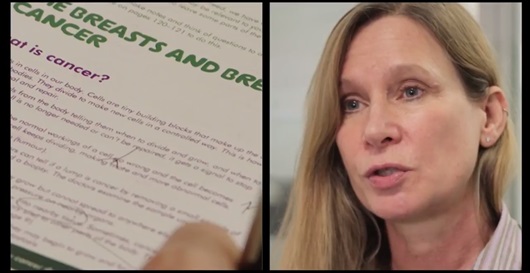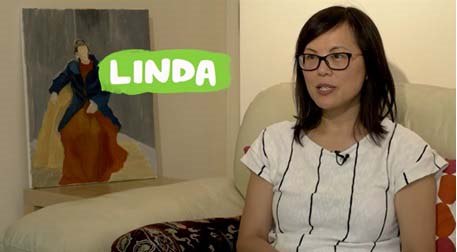In our last blog of 2017, editor Steven talks about the cancer information videos that we have produced this year.
It’s been a busy year for making videos. We kicked off 2017 by introducing the CID team and explaining how we produce our information. We covered everything from how it’s written, peer reviewed, edited and presented, right through to how it’s adapted for different audiences and different needs. The video is book-ended by Julia, who was diagnosed with breast cancer, and describes the support Macmillan’s information provided.

We then released a set of videos about prostate cancer. In ‘Prostate cancer symptoms and the PSA test’, Dr Shiv Bhanot explains what prostate cancer is, what to expect when going to the GP and the test used to diagnose it. We also have three videos on how each type of prostate cancer – early (localised), locally advanced and advanced (metastatic) – is treated. These all feature Patrick, who talks about how he coped throughout his own diagnosis and treatment.

Next up, we had new titles on cancer and eating. In ‘Eating problems and cancer’, dietitian Debbie Provan describes the eating difficulties that can result from cancer and its treatment, and how to manage them. Our case study Conor also talks about the problems he experienced after having treatment for bone cancer.

Additionally, we wanted to address some frequently asked questions about diet and cancer. In ‘Healthy eating and cancer’, dietitian Jane Clarke dispels a few myths and explains the importance of eating healthily when you have cancer.

Lymphomas were the subject of our next sequence of videos. In ‘Diagnosing lymphoma’, Dr Robert Marcus explains what it is, what different types of lymphoma there are, how it’s diagnosed and how people are supported when diagnosed. In ‘Lymphoma – Watch and wait’, he talks about the option used by doctors to delay treatment for lymphoma until it is needed. It will hopefully reassure people who are worried that delaying treatment will make their cancer worse. In both videos, Linda talks about her experience of being diagnosed with lymphoma and how she found the process of watch and wait.

The highlight of the year for me was producing the videos on hair loss. Having such a wide area to cover, we decided to split this into four titles. In ‘Coping with hair loss’, we gathered together three people at various stages of hair loss, Amanda, Lurline and Doug, and filmed them talking openly with each other about their experience of losing their hair. In the next video, we followed Amanda as she had a wig fitted and styled by Trevor Sorbie MBE from My New Hair, who also gives tips for choosing and styling a wig. We also produced two tutorial videos, one on eye make-up tips, which we filmed with Lurline and a Boots beautician. The other explored headwear options after hair loss, which features Nicky from Suburban Turban giving Amanda some tips. We got an amazing response to these videos when we promoted them on Facebook, with them being viewed 150,000 times and reaching 465,000 people in three weeks!

In our latest video on testicular cancer, Dr Jonathan Aning explains what the condition is, what symptoms to look out for, the treatments available and the importance for men to regularly check themselves. Our case study Kieran also talks about how he coped with cancer, and his worries about sex and fertility throughout his treatment.

Videos to come in the new year include ‘After brain tumour treatment’, ‘Diagnosing and managing lymphoedema’ and another on neutropenic sepsis, so keep your eyes peeled on the website for those.
To see what else Macmillan's cancer information team has been blogging about, please visit our blog home page! You can subscribe to receive our blogs by email or RSS too.
We're with you every step of the way
The Macmillan team is here to help. Our cancer support specialists can answer your questions, offer support, or simply listen if you need a chat. Call us free on 0808 808 00 00.
Comments? Feel free to add them below (you need to be logged in).
Keep in touch Follow Macmillan’s cancer information team on Twitter @mac_cancerinfo
Whatever cancer throws your way, we’re right there with you.
We’re here to provide physical, financial and emotional support.
© Macmillan Cancer Support 2025 © Macmillan Cancer Support, registered charity in England and Wales (261017), Scotland (SC039907) and the Isle of Man (604). Also operating in Northern Ireland. A company limited by guarantee, registered in England and Wales company number 2400969. Isle of Man company number 4694F. Registered office: 3rd Floor, Bronze Building, The Forge, 105 Sumner Street, London, SE1 9HZ. VAT no: 668265007